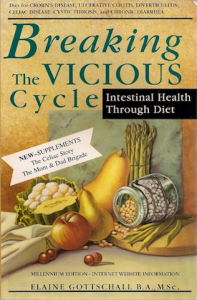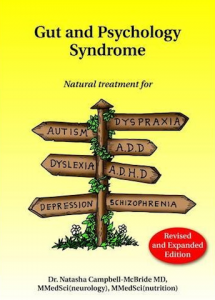
This book saved my health and the health of my daughter.
The Specific Carbohydrate Diet is a special dietary program for very sick people. This diet was originally, developed and clinically tested by Drs Sidney and Merrill Haas. They wrote a book in the 1950s called Management of Celiac Disease, where they treated and cured hundreds of cases of celiac disease and cystic fibrosis of the pancreas.
At this time, celiac disease included a number of other disorders the medical profession now considers different diseases such as: ulcerative colitis, diverticulitis and chronic diarrhea. For some reason, SCD disappeared as a first line of treatment for intestinal disease around the time that celiac disease became connected with the protein gluten. Celiac disease is now considered a genetic disorder and the standard treatment is the Gluten Free Diet. This diet works well with about half of all celiac patients.
The SCD would have likely passed into medical history, if it wasn’t for a mom with a very sick child. Elaine Gottchall’s daughter was dying from ulcerative colitis and was plagued by seizures. She found out about the diet, cured her daughter, and went back to school and became a biochemist. She wrote a number of books including: Breaking the Vicious Cycle: Intestinal Health Through Diet. She became a crusader on behalf of dietary approaches to illnesses.
Elaine Gottchall developed a website called: www.breakingtheviciouscycle.info. The website was formed to help people with digestive disorders find answers not known in conventional medical circles. The modern SCD restricts all disaccharide sugars and complex starches. All processed foods are eliminated. Grains, legumes, and most beans are eliminated. No starchy vegetables are allowed. Dairy is carefully restricted or in some serious cases eliminated. Nuts and seeds can be eaten with care. The diet consists of unprocessed fats, proteins and monosaccharide sugars. Monosaccharide sugars include non-starchy vegetables, whole fruit, and honey.
Over time something began to happen. People using the SCD found their other chronic health conditions became less serious or completely disappeared. Diseases caused by inflammation or autoimmune reactions seem to be helped in some way by the diet. This includes: asthma, allergies, chronic sinus infections, type two diabetes, arthritis, MS, heart disease, seizure disorders, epilepsy, depression, schizophrenia, autism and the spectrum disorders. The list continues to grow.

GAPS is the new SCD. GAPS adds probiotics and nourishing traditional food preparation.
Gut and Psychology Syndrome (GAPS): A New Evolution of the SCD
The Gut and Psychology Syndrome is a new evolution of the SCD. It was developed by Dr Natasha Campbell-McBride, a neurologist and nutritionist working in the UK. She has a son diagnosed with autism. As a neurologist she knew the conventional medical profession had little to offer her son. She took a degree in nutrition. She was introduced to the SCD at a lecture by Elaine Gottchall.
Over the last 15 years she has used the SCD clinically with her patients. She has changed the SCD in two major ways. She uses high dose probiotic treatment and WAPF traditional food preparation methods with her patients. She has had very good results in her clinical practice with patients with autism, schizophrenia and the spectrum disorders. Her son is now a teenager and no one would know he was once diagnosed with autism.
Dr Campbell-McBride has written two lay publications: Gut and Psychology Syndrome and Put Your Heart in Your Mouth. Both are available in the Kamloops Public Library. She has two websites that outlines the program called: www.gaps.me and www.behealthy.org.uk. A helpful North American website is called: www.gapsdiet.com. GAPS Guide is a website to help newcomers to the diet.
More Posts the SCD and GAPS
Specific Carbohydrate Diet: A Personal Story
Specific Carbohydrate Diet: Common Problems
Industrial Food Sickness
What is a Healthy Gut?
Questions about SCD, GAPS and PD
More Posts on Related Diet Topics
Supplements or Superfoods
Supplements or Superfoods: A Personal Story
Funny Troubles
Diabetes: A Modern Epidemic
Update December 16, 2009: This essay is by Dr Natasha Campbell-McBride about Gut and Psychology Syndrome.
Updated March 1, 2010: This is from dogtorj.com about Gut Absorption Recovery Diet (GARD). John B. Symes is a vet and uses his experiences with animals to enlighten us on human health. The diet sounds a lot like the SCD/GAPS. It would be good for people with seizure disorders to read his material.
Updated April 16, 2010: Here is a video presentation by Mercola with Dr Andrew Wakefield. You may know of his work with developmental disorders, bowel disease and early exposure to vaccines. It is a long presentation but worth it for anyone interested in Autism and the Spectrum Disorders.
Updated April 16, 2011: Here is Dr Natasha Campbell-McBride lecturing on GAPS at the Weston A Price Foundation 2007 Conference. Her lecture is in two parts and can be downloaded here. Sally Fallon gives a brief overview of the research of Dr Weston A Price before introducing Dr Natasha Campbell-McBride. Please put some time aside to listen to this very interesting lecture:
WAPF2007 GAPS part1 6203.mp3
WAPF2007 GAPS part2 6219.mp3
Updated April 22, 2011: Sarah Smith is the WAPF Chapter Co-leader for Las Cruces, NM. She is also on the GAPS program with her family. If you are interested in GAPS recipes, gardening, and traditional meal preparation, please see Nourished and Nurtured.


